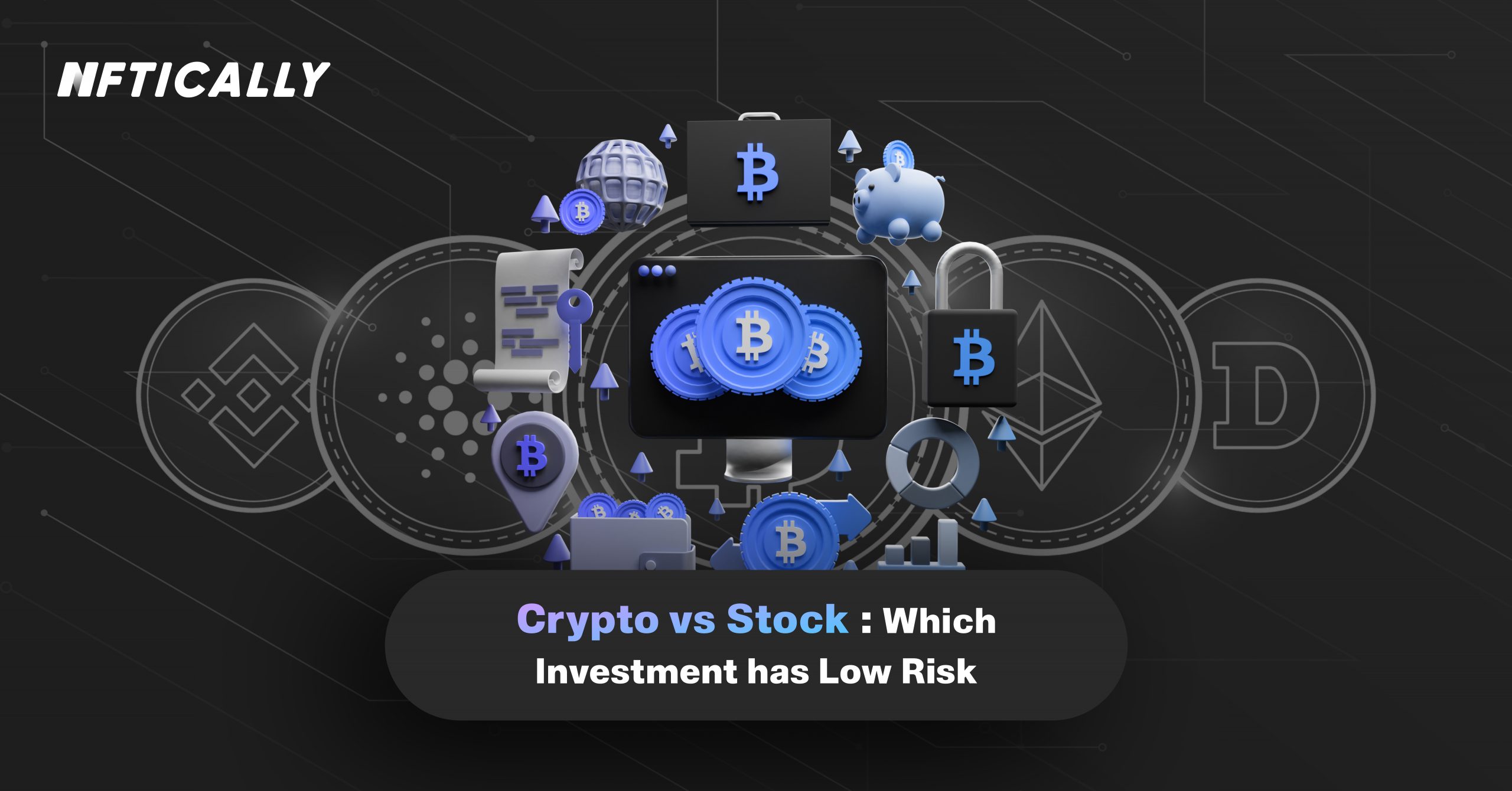Crypto vs. Stock Which Investment Has Lower Risk
Discover the low risk investment options when comparing crypto and stock. Make informed investment decisions for a secure financial future.

In recent years, the financial world has witnessed a significant shift in investment trends. Traditional stock markets have long been the go-to avenue for investors looking to grow their wealth. However, the rise of cryptocurrencies and the burgeoning NFT (Non-Fungible Token) market have introduced new opportunities and challenges for investors. One of the paramount concerns for any investor is risk management. In this article, we will explore the risk factors associated with both cryptocurrencies and stocks, and delve into the question of which investment carries lower risk.
Cryptocurrencies and NFTs: A Brief Overview
Before we dive into the comparison, let's take a moment to understand the key terms and concepts involved:
- Cryptocurrencies: Cryptocurrencies are digital or virtual currencies that use cryptography for security. Bitcoin, Ethereum, and Ripple are some of the well-known cryptocurrencies. They are traded on various online platforms and have gained popularity for their potential for high returns.
- NFTs (Non-Fungible Tokens): NFTs are unique digital assets representing ownership of a specific item or piece of content, such as artwork, collectibles, or even virtual real estate. They are bought and sold on blockchain-based marketplaces, and their prices can vary significantly.
Now, let's explore the risk factors associated with both of these investment options.
Risk Factors in Cryptocurrencies
- Price Volatility: Cryptocurrencies are infamous for their price volatility. Prices can skyrocket one moment and plummet the next. Factors such as market sentiment, regulatory changes, and technological developments can trigger wild price swings.
- Regulatory Uncertainty: The regulatory environment for cryptocurrencies is still evolving. Changes in regulations in different countries can have a profound impact on the value and legality of certain cryptocurrencies.
- Security Risks: Cryptocurrency exchanges and wallets are susceptible to hacking and security breaches. Investors can lose their assets if they do not take adequate security measures.
- Lack of Intrinsic Value: Unlike stocks, cryptocurrencies do not represent ownership in a company or generate cash flows. Their value is often driven by speculation and market dynamics.
Risk Factors in Stocks
- Market Volatility: Stock markets also experience volatility, albeit to a lesser extent than cryptocurrencies. Economic events, company performance, and geopolitical factors can influence stock prices.
- Company-Specific Risks: Investing in individual stocks carries the risk of company-specific issues, such as poor management decisions, financial troubles, or legal challenges.
- Diversification: The risk associated with stocks can be mitigated through diversification. However, managing a diversified portfolio can be complex and may require significant time and effort.
- Market Sentiment: Stock prices are influenced by market sentiment, which can sometimes lead to irrational pricing based on fear or greed.
Comparing the Risks
Now, let's compare the risks associated with cryptocurrencies and stocks based on the keywords you provided:
NFT Market Price?and?NFT Tokens Price: The?NFT market price?is highly volatile, similar to cryptocurrency prices. The value of NFTs can fluctuate dramatically based on demand and trends in the digital art and collectibles space.
Best NFT Gaming?and?NFT Price Chart: NFT gaming introduces a unique subset of risk. While it can offer lucrative opportunities, it also relies heavily on the success of the gaming project. NFT price charts for gaming tokens can be highly speculative.
NFT Blockchain?and?Best NFT Marketplaces: The choice of blockchain and marketplace for NFT transactions can impact the security and legitimacy of NFT investments. Research and due diligence are essential to minimize these risks.
NFT Marketplaces?and?NFTs for Sale: Investing in NFTs involves using?NFT marketplaces. The reputation and security of these platforms vary, which can affect the overall risk of your NFT investments.
NFT Price: The price of NFTs can be influenced by speculative bubbles, similar to cryptocurrency prices. Investors should be cautious about the potential for sudden price crashes.
Diversification: A Risk Management Strategy
One of the most fundamental principles of risk management in the world of investments is diversification. This strategy involves spreading your investments across various asset classes to reduce the impact of a poor-performing investment on your overall portfolio. Let's see how diversification can apply to the three key areas we've discussed: cryptocurrencies, stocks, and NFTs.
- Cryptocurrencies: Given the high volatility and uncertainty in the cryptocurrency market, it's prudent not to put all your financial resources into cryptocurrencies alone. Instead, consider allocating a portion of your investment portfolio to crypto if you believe in its long-term potential. This way, the potential gains from cryptocurrencies can offset losses in other areas.
- Stocks: Stocks can offer stability and long-term growth potential when chosen wisely. However, individual stocks can be risky. Diversifying your stock investments across different sectors, industries, and geographic regions can help reduce the impact of a downturn in any one sector or company.
- NFTs: NFTs, being a relatively new and speculative investment, also benefit from diversification. Rather than putting all your funds into a single NFT or NFT project, consider diversifying across different types of NFTs or projects. This can help spread the risk associated with the highly variable NFT market.
Risk Assessment and Research
In any investment decision, conducting thorough research and due diligence is critical. Here are some steps to consider before committing your funds:
- Understand Your Risk Tolerance: Assess your personal risk tolerance, which is your ability and willingness to withstand fluctuations in your investment portfolio. Your risk tolerance should guide your asset allocation decisions.
- Stay Informed: Keep abreast of the latest developments in the crypto, stock, and NFT markets. Understand the factors influencing price movements and market sentiment.
- Diversify Wisely: If you decide to invest in cryptocurrencies, stocks, and NFTs, create a diversified portfolio that aligns with your risk tolerance and investment goals. Rebalance your portfolio periodically to maintain the desired asset allocation.
- Seek Professional Advice: Consider consulting with a financial advisor or investment professional who can provide tailored advice based on your individual circumstances.
In the debate of crypto vs. stock, it's clear that both investment options come with their own set of risks. Cryptocurrencies offer high volatility and regulatory uncertainty, while stocks have their own challenges related to market sentiment and company-specific issues. When considering the keywords related to the NFT market, it's evident that NFT investments also carry unique risks, especially regarding price volatility and the choice of blockchain and marketplaces.
What's Your Reaction?















